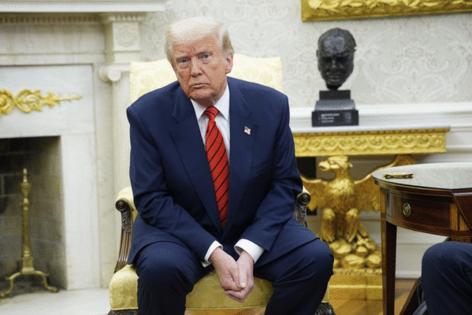Trump says Putin will 'follow through,' rebuffs Ukraine on deal
Published in News & Features
WASHINGTON — U.S. President Donald Trump said he believed Russian President Vladimir Putin would follow through on striking a ceasefire agreement and accused Ukraine of attempting to negotiate an economic deal with the U.S., in the latest turn in his whipsaw effort to negotiate a temporary truce in the ongoing conflict.
“I want to make sure that he follows through, and I think he will,” Trump said of Putin on Monday in the Oval Office. “I don’t want to go secondary tariffs on his oil, but I think, you know, something I would do if I thought he wasn’t doing the job.”
The remarks came after Trump over the weekend threatened “secondary tariffs” on Russia and told NBC News in a phone call that he was “very angry” at Putin. The remarks marked the strongest criticism he’s offered of the Russian president to date, as Trump tries to quickly secure a halt to the fighting sparked by Putin’s invasion of Ukraine. While Ukraine and Russia have agreed to a partial truce, a broader ceasefire has eluded Trump, who before taking office vowed to quickly resolve the war.
Trump in the interview with NBC News said he was “pissed off” at Putin for casting doubt on Ukrainian President Volodymyr Zelenskyy’s legitimacy as a negotiating partner, and threatened curbs on “all oil coming out of Russia.”
But on Monday, Trump had turned his ire back to the Ukrainian leader — while conceding he had only read reports that Kyiv was seeking new terms.
“I heard that they’re now saying, well, I’ll only do that deal if we get into NATO or something to that effect,” Trump said. The president, who has previously said Ukraine’s NATO desire could not be part of an eventual deal, said membership was never part of the discussion and would not be accepted by Russia.
A draft proposal of Ukraine’s requested changes concerns the country’s effort to enter the European Union, not NATO, and sought a pledge for more U.S. investment in the country.
Russia is one of the world’s three largest oil producers and any attempt by the U.S. to punish purchases of Russian supplies could have a far-reaching impact on the oil market, including by intensifying inflationary pressures in the U.S. Trump’s tougher talk toward Putin caused crude prices to rise Monday. West Texas Intermediate, the U.S. benchmark, climbed to $71.48 late Monday, well beyond the mid-$60s that Trump was celebrating earlier this month.
Trump’s comments suggested a possible souring in U.S.-Russian relations over the pace of the ceasefire talks. Trump has previously voiced concern that Moscow could be slow-walking negotiations. The U.S. president’s tougher talk was spurred by comments Putin made last Friday implicitly challenging Zelenskyy’s legitimacy by proposing the United Nations take over Ukraine with a temporary government overseen by the U.S. and possibly some European countries.
“He’s supposed to be making a deal with him, whether you like him or don’t like him,” Trump told reporters Sunday about Putin. “So I wasn’t happy with that. But I think he’s going to be good.”
Trump told NBC he and Putin planned to speak again this week. The Kremlin on Monday said Putin remained open to contacts with Trump. However, a spokesman, according to the state-run Tass news agency, told reporters no call had been scheduled yet.
The last publicly disclosed call between the two leaders was earlier in March, a conversation that saw Putin refuse to grant Trump a 30-day ceasefire. Putin instead agreed only to limit attacks on Ukraine’s energy infrastructure while demanding that the U.S. and other nations stop the flow of weapons and intelligence to the neighboring country he invaded.
After subsequent talks held separately with Ukrainian and Russian representatives in Saudi Arabia, the U.S. said the two nations had agreed to a maritime ceasefire in the Black Sea. But while Ukraine said it would observe the ceasefire, Russia said its involvement depended on preconditions, including sanctions relief.
The threat of secondary tariffs is a novel tactic Trump has adopted to ramp up economic pressure on other countries. He’s previously threatened to impose tariffs on countries that buy oil from Venezuela in a bid to choke off its trade with other nations.
_____
(With assistance from Jennifer A. Dlouhy.)
_____
©2025 Bloomberg L.P. Visit bloomberg.com. Distributed by Tribune Content Agency, LLC.







Comments